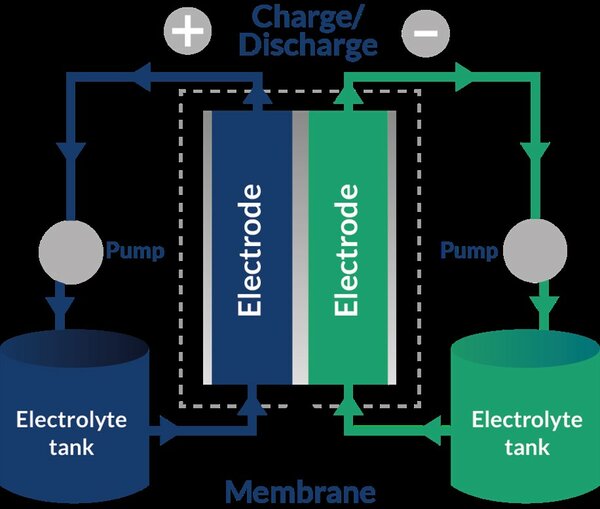The NewBat project represents a significant advancement in addressing the challenges of integrating renewable energy sources into the power grid and managing peak energy demands. This initiative is particularly timely given the significant increase in renewable energy production and the corresponding rise in energy demand, notably from electric vehicles, which is leading to increased congestion in the electricity network.
One of the central challenges in the current energy landscape is the reliance on expensive and environmentally harmful battery technologies, which often use rare metals like lithium and vanadium. These factors contribute not only to high costs but also to sustainability concerns. The NewBat project aims to tackle these issues head-on by developing an improved type of redox flow battery (see figure 1) that utilizes organic redox couples instead of these rare metals and developing new reactor cell concepts.
The project's approach is twofold. Initially, it focuses on enhancing the reactor cell of the battery by employing commonly available membranes and membrane concepts. This strategy is aimed at moving away from the costly proton-exchange membranes currently in use, thereby reducing the overall expense of the battery systems.
The second phase of the project explores the use of organic redox couples that can be directly extracted from nature. This innovative approach not only promises to reduce costs further but also increases the sustainability of the battery by relying on naturally occurring materials.
By developing a new type of Redox Flow Battery that is both cheaper and more sustainable than existing versions, the NewBat project addresses the critical need for effective energy storage solutions in a world increasingly reliant on renewable energy sources. This initiative not only aims to alleviate grid congestion by providing a more efficient way to store and distribute renewable energy but also aligns with global sustainability goals by reducing dependency on finite and environmentally damaging resources.
Overall, the NewBat project offers the potential to significantly enhance the reliability and efficiency of the power grid while contributing to environmental conservation and energy independence, marking a pivotal step forward in the development of energy storage technologies.
The NewBat initiative is a collaborative effort that includes the project partners the MMP group from TU/e, QuadriE, Woonstichting 'thuis, ValleiEnergie, and MTSA. This project receives co-financing from TKI-Urban Energy.

Figure 1 Set up of a typical Redox Flow Battery
Contact information:
Lex van Dijk
Helix - STO 0.50
l.v.dijk1@tue.nl